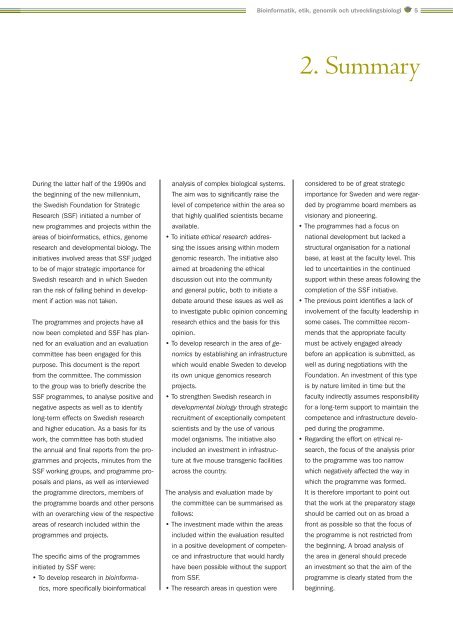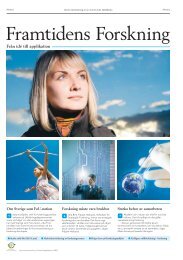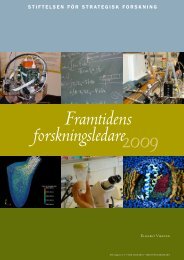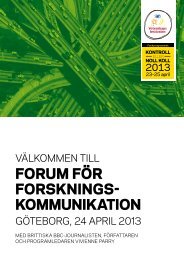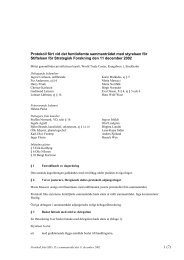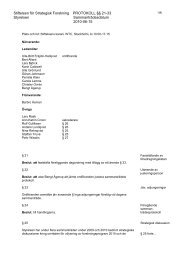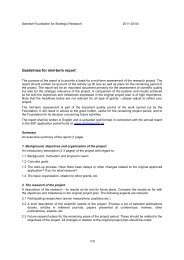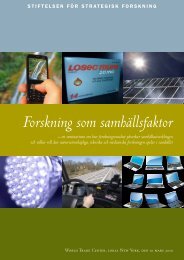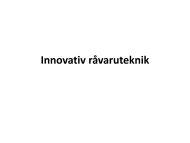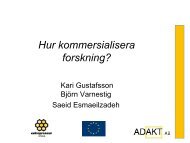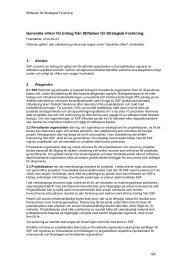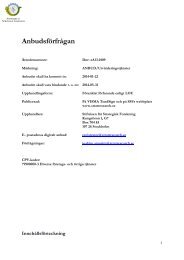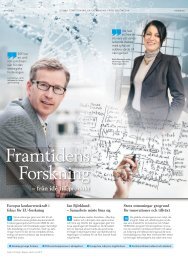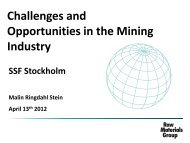Bioinformatik, gen-etik, genomik och utvecklingsbiologi
Bioinformatik, gen-etik, genomik och utvecklingsbiologi
Bioinformatik, gen-etik, genomik och utvecklingsbiologi
You also want an ePaper? Increase the reach of your titles
YUMPU automatically turns print PDFs into web optimized ePapers that Google loves.
During the latter half of the 1990s and<br />
the beginning of the new millennium,<br />
the Swedish Foundation for Strategic<br />
Research (SSF) initiated a number of<br />
new programmes and projects within the<br />
areas of bioinformatics, ethics, <strong>gen</strong>ome<br />
research and developmental biology. The<br />
initiatives involved areas that SSF judged<br />
to be of major strategic importance for<br />
Swedish research and in which Sweden<br />
ran the risk of falling behind in development<br />
if action was not taken.<br />
The programmes and projects have all<br />
now been completed and SSF has planned<br />
for an evaluation and an evaluation<br />
committee has been engaged for this<br />
purpose. This document is the report<br />
from the committee. The commission<br />
to the group was to briefly describe the<br />
SSF programmes, to analyse positive and<br />
negative aspects as well as to identify<br />
long-term effects on Swedish research<br />
and higher education. As a basis for its<br />
work, the committee has both studied<br />
the annual and final reports from the programmes<br />
and projects, minutes from the<br />
SSF working groups, and programme proposals<br />
and plans, as well as interviewed<br />
the programme directors, members of<br />
the programme boards and other persons<br />
with an overarching view of the respective<br />
areas of research included within the<br />
programmes and projects.<br />
The specific aims of the programmes<br />
initiated by SSF were:<br />
• To develop research in bioinformatics,<br />
more specifically bioinformatical<br />
analysis of complex biological systems.<br />
The aim was to significantly raise the<br />
level of competence within the area so<br />
that highly qualified scientists became<br />
available.<br />
• To initiate ethical research addressing<br />
the issues arising within modern<br />
<strong>gen</strong>omic research. The initiative also<br />
aimed at broadening the ethical<br />
discussion out into the community<br />
and <strong>gen</strong>eral public, both to initiate a<br />
debate around these issues as well as<br />
to investigate public opinion concerning<br />
research ethics and the basis for this<br />
opinion.<br />
• To develop research in the area of <strong>gen</strong>omics<br />
by establishing an infrastructure<br />
which would enable Sweden to develop<br />
its own unique <strong>gen</strong>omics research<br />
projects.<br />
• To strengthen Swedish research in<br />
developmental biology through strategic<br />
recruitment of exceptionally competent<br />
scientists and by the use of various<br />
model organisms. The initiative also<br />
included an investment in infrastructure<br />
at five mouse trans<strong>gen</strong>ic facilities<br />
across the country.<br />
The analysis and evaluation made by<br />
the committee can be summarised as<br />
follows:<br />
• The investment made within the areas<br />
included within the evaluation resulted<br />
in a positive development of competence<br />
and infrastructure that would hardly<br />
have been possible without the support<br />
from SSF.<br />
• The research areas in question were<br />
<strong>Bioinformatik</strong>, <strong>etik</strong>, <strong>gen</strong>omik <strong>och</strong> <strong>utvecklingsbiologi</strong> 5<br />
2. Summary<br />
considered to be of great strategic<br />
importance for Sweden and were regarded<br />
by programme board members as<br />
visionary and pioneering.<br />
• The programmes had a focus on<br />
national development but lacked a<br />
structural organisation for a national<br />
base, at least at the faculty level. This<br />
led to uncertainties in the continued<br />
support within these areas following the<br />
completion of the SSF initiative.<br />
• The previous point identifies a lack of<br />
involvement of the faculty leadership in<br />
some cases. The committee recommends<br />
that the appropriate faculty<br />
must be actively engaged already<br />
before an application is submitted, as<br />
well as during negotiations with the<br />
Foundation. An investment of this type<br />
is by nature limited in time but the<br />
faculty indirectly assumes responsibility<br />
for a long-term support to maintain the<br />
competence and infrastructure developed<br />
during the programme.<br />
• Regarding the effort on ethical research,<br />
the focus of the analysis prior<br />
to the programme was too narrow<br />
which negatively affected the way in<br />
which the programme was formed.<br />
It is therefore important to point out<br />
that the work at the preparatory stage<br />
should be carried out on as broad a<br />
front as possible so that the focus of<br />
the programme is not restricted from<br />
the beginning. A broad analysis of<br />
the area in <strong>gen</strong>eral should precede<br />
an investment so that the aim of the<br />
programme is clearly stated from the<br />
beginning.


